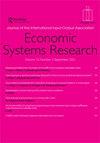Income and investment, not energy policy, are driving GHG emission intensities
IF 1.8
4区 经济学
Q2 ECONOMICS
引用次数: 0
Abstract
Global greenhouse gas (GHG) emissions continue to rise but, at the same time, emission intensities associated with domestic consumption and territorial production have declined albeit at vastly different rates across economies. To identify the socioeconomic factors that drive this cross-country variation, we combine input–output modelling with panel data analysis. Using the World Input–Output Database, we estimate GHG intensities separately for domestic consumption and for territorial production. For the regression analysis, we consider several socioeconomic factors that capture development features, exposure to international trade, as well as energy prices and GHG-relevant programmes. Our results show that development-type factors, such as per capita income, capital-labour ratios, and investments, are the primary drivers of cross-country differences. Energy prices and domestic GHG policies are not major drivers. We also find that reductions in intensities are primarily through changes in techniques rather than compositional changes in the structure of economies.推动温室气体排放强度的是收入和投资,而不是能源政策
全球温室气体(GHG)排放量继续上升,但与此同时,与国内消费和领土生产相关的排放强度下降了,尽管不同经济体的下降速度差异很大。为了确定驱动这种跨国差异的社会经济因素,我们将投入产出模型与面板数据分析相结合。利用世界投入产出数据库,我们分别估算了国内消费和领土生产的温室气体强度。对于回归分析,我们考虑了几个社会经济因素,这些因素反映了发展特征、国际贸易、能源价格和温室气体相关计划。我们的研究结果表明,发展类型的因素,如人均收入、资本劳动比率和投资,是国家间差异的主要驱动因素。能源价格和国内温室气体政策不是主要驱动因素。我们还发现,强度的降低主要是通过技术的变化,而不是经济结构的组成变化。
本文章由计算机程序翻译,如有差异,请以英文原文为准。
求助全文
约1分钟内获得全文
求助全文
来源期刊

Economic Systems Research
ECONOMICS-
CiteScore
5.60
自引率
4.00%
发文量
17
期刊介绍:
Economic Systems Research is a double blind peer-reviewed scientific journal dedicated to the furtherance of theoretical and factual knowledge about economic systems, structures and processes, and their change through time and space, at the subnational, national and international level. The journal contains sensible, matter-of-fact tools and data for modelling, policy analysis, planning and decision making in large economic environments. It promotes understanding in economic thinking and between theoretical schools of East and West, North and South.
 求助内容:
求助内容: 应助结果提醒方式:
应助结果提醒方式:


